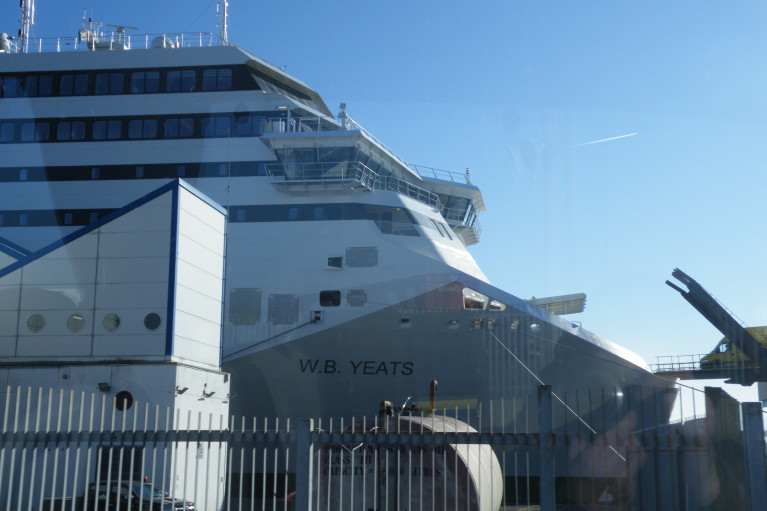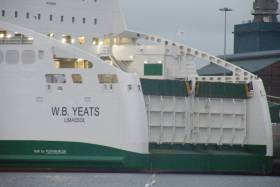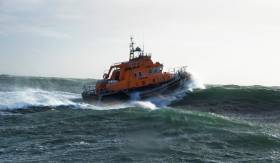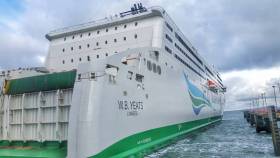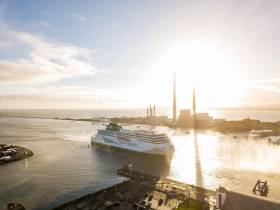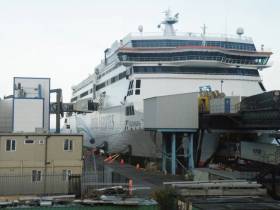Displaying items by tag: Irish Ferries
Irish Continental Group, parent company of Irish Ferries has reported higher revenues and earnings for the year to the end of December, as its new ferry, the W.B.Yeats, came into service.
As according to RTE News, ICG's revenue for the year increased by 8.2% to €357.4m, while its earning before interest, taxes, depreciation and amortisation rose by almost 27% to €86.8m from €68.4m.
Overall group operating profit (EBIT) for the year increased by 8.2% to €64.9m and the company said it is proposing a final dividend of 8.99 cent, an increase of 5%.
Shares in the company sailed over 4% higher in Dublin trade this morning.
For more including ICG's container shipping divisions click here.
Increased Revenue at Irish Ferries Following Disruptions in 2018
Irish Continental Group, the parent company of Irish Ferries has reported revenue of €308.8m in the first ten months of 2019, an increase of 8.2pc on the same period last year.
As the Independent.ie writes, ICG said a "significant" proportion of the improvement came from the ferries division, on the back of improved scheduling reliability following major disruptions in 2018.
Despite this, it experienced "some volatility in carryings as key Brexit dates were approached and subsequently postponed".
The overall effect of this continuing uncertainty "is generating negative impact on consumer sentiment and trade flows as investment decisions are delayed".
For further reading click here.
Operator Irish Ferries Among Firms Approved by UK Govt to Bid For Brexit Freight Contracts
A total of eight ferry, aviation and rail firms have been approved to bid for British Government contracts to import vital medicines into the UK after Brexit.
Britain's Transport Secretary Grant Shapps described the group as “high-quality and experienced” as he made the announcement.
His predecessor Chris Grayling faced calls to resign earlier this year after handing a £14 million contract to Seaborne Freight to run freight services, despite having no ships or trading history.
The eight firms appointed to a freight procurement framework are Brittany Ferries, DFDS, Irish Ferries, P&O Ferries, Seatruck and Stena, as well as aviation firm Air Charter Services and train operator Eurotunnel.
For more on the story click BreakingNews.ie
Exporters have generally welcomed next week’s changes to ferry timetables that, between Irish Ferries and Stena Line, will see a sailing from Ireland to Cherbourg every day of the week on alternating weeks, as AgriLand reports.
The change from next Monday 27 May will see Irish Ferries’s new and award-winning WB Yeats sail from Dublin to Cherbourg on Monday, Wednesday and Friday one week, then Sunday, Tuesday, Thursday and Saturday the following week, and so on until the end of September.
Stena Line sails from Rosslare to Cherbourg every Tuesday, Thursday and Saturday, meaning that next week and every fortnight thereafter there will be a sailing once a day from Ireland to the French port.
The change is being seen as a positive one by exporters — however complaints remain over lack of dialogue from the Department of Agriculture, Food and the Marine. AgriLand has more on the story HERE.
Europort in A Storm - Rosslare Out to Catch Brexit Tide
#ferries - At the end of last year Irish Continental Group (ICG) announced its decision not to run its Irish Ferries services this summer to France from Rosslare, Co Wexford, the move was met with both surprise and shock in the south-east port.
After all, the Irish Independent writes, the company's new 'cruise ferry', the WB Yeats, which can carry more than 1,800 passengers and 1,200 vehicles, had just arrived in Ireland after a delay and there were great expectations that ICG would put the ship on its Rosslare to Cherbourg, France route.
Instead, ICG decided to operate the ferry service from Dublin Port to Cherbourg, lured by the scope for additional business in the capital.
Irish Ferries is still operating its Rosslare-to-Pembroke service while Stena runs from the south eastern port to Fishguard as well as to Cherbourg.
But if many were stunned by the move, for some in the Rosslare business community it was a progression for Irish Ferries that should have been anticipated.
According to Damien Roche, managing director of Rosslare-based Roche Logistics Group, which he co-owns with his brother Conor, it was simply a numbers game for ICG.
To read much more on the ferryport click here.
Afloat.ie adds Irish Ferries decision last year to abandon Rosslare also involved a second route to France, Roscoff in Brittany which was only operated in the peak-season summer months. This leaves Brittany Ferries as the sole operator maintaining an Ireland-Brittany link on the Cork-Roscoff route which is experiencing a passenger boost.
Rosslare Harbour Lifeboat Assists In Evacuation Of Ferry Passenger Taken Ill On Late Night Crossing
#Lifeboats - The RNLI’s all-weather lifeboat based in Rosslare Harbour was launched at 10.38pm on Saturday night (2 March) to assist a passenger onboard an Irish Ferries vessel bound for Pembroke in Wales.
The passenger ferry Oscar Wilde, which was located 20 miles off the Wexford coast at the time, asked for assistance in evacuating a passenger who had become ill.
Sea conditions were unfavourable for the volunteers on the Rosslare Harbour lifeboat to go alongside the ferry.
The Irish Coast Guard helicopter Rescue 117 from Waterford was also tasked and quickly arrived on scene. After attempts to airlift the casualty it was deemed too dangerous.
The Oscar Wilde returned to Rosslare Europort at 1am, where an ambulance was waiting to bring the casualty to hospital. The RNLI volunteers in their Severn class lifeboat stood by the passenger ferry for the duration.
Sea conditions were very poor at the time, with a strong Force 7 to 8 gale and heavy rain.
Coxswain Eamonn O’Rourke commented that the volunteer crew of the lifeboat had to endure very challenging conditions.
Speaking afterwards, Rosslare Harbour RNLI lifeboat operations manager David Maloney said: “Conditions at sea tonight were challenging for our coxswain and lifeboat crew and I would like to commend them for their efforts in enduring a rough passage in the dark, and late at night on a Saturday evening, to be of assistance.”
#ferries - Operator Irish Ferries has brought a High Court challenge over a finding it must pay compensation to thousands of passengers affected by the cancellation of sailings between Ireland and France last summer.
As The Irish Times reports, the ferry company says it had to cancel the services because a new ferry, the WB Yeats, which it had ordered to operate the service between Dublin and Cherbourg, was delayed for several months.
Its legal challenge is to the National Transport Authority’s decision last January that, arising out of the cancellations, the company breached EU regulations concerning the rights of passengers travelling by sea.
The NTA issued the company with two notices requiring it pay compensation to impacted passengers within a period of two months.
The notices direct the company to pay compensation to passengers impacted by the cancellations who had to travel from Rosslare instead of Dublin and from Roscoff instead of Cherbourg.
The notices also state passengers who were delayed in reaching their final destination who have already requested compensation from the company must also be paid compensation.
Non-compliance with the notices is an offence, with a maximum fine on conviction of €250,000.
The company disputes the NTA’s finding and contends the notices are invalid, irrational, disproportionate and breach its rights under the Constitution and EU law. It also argues the NTA has misinterpreted the relevant EU regulations.
The cancellations occurred because a new ship it had commissioned from the German shipyard Flensburger Schiffbau-Gesellschaft was delivered some “200 days” late, Paul Gallagher SC, for the company, told the High Court on Monday.
The delay came as a shock to Irish Ferries and made headlines in the media, he said.
For further reading on this development, click here.
UK Maritime Union Steps Up Campaign Against RoRo Freight and Passenger Ferry Operators
#ferries - A UK transport union is continuing its programme of objections to ferry and other shipping operators who sail under flags of convenience and skirt around UK employment laws and rates of pay with a protest which will take place this Friday, at Holyhead Port, Anglesey in north Wales.
The protest by the National Union of Rail, Maritime and Transport Workers (RMT), according to HandyShippingGuide is to commence at 06:30 hours and targeting the 08:25 sailing of the Irish Ferries RoRo freight and passenger ferry WB Yeats, is to demand seafarer jobs, enforcement of employment law and trade union rights according to the union.
The €144 million luxury vessel (made a delivery voyage to Dublin Port) in December and (last month entered service) is registered under the Cypriot flag which has incensed the union.
For further reading on this ferry development, click here
Afloat adds the sailing targeted does not tally with W.B. Yeats roster, as according to the Irish Ferries website the ropax Epsilon is to depart Holyhead at the slightly earlier time of 08.15. While on that morning W.B. Yeats will notably be on the other side of the Irish Sea with a scheduled departure from Dublin at 08.05hrs.
Irish Ferries Issue Statement Regarding NTA Decision Concerning Cancellation of W.B. Yeats Service
#ferries - Irish Ferries have expressed its disappointment with the issuing of notices by the National Transport Authority (NTA) yesterday in respect of cancellations that arose following the delayed arrival of the new W.B. Yeats ship.
These cancellations were due to extraordinary circumstances which were completely outside of the company’s control. Since the delay was due to unforeseen delays by the shipbuilder FSG, and was notified to passengers months ahead of planned sailings, Irish Ferries does not agree that the company infringed the relevant EU Regulation. In dealing with its customers Irish Ferries believes it took every reasonable action to provide passengers with alternative travel options, from a no-quibble immediate refund to allow them to make alternative travel plans, as well as alternative sailings on the Oscar Wilde out of Rosslare Europort and Land-Bridge alternatives via the UK.
Irish Ferries would like to state again that it sincerely regrets the disruption to its passengers and once again conveys its apologies to all of those who were affected last year. A goodwill gesture of €150 discount for a sailing to France this year has already been provided to all customers impacted by the cancellations.
Ongoing discussions with the NTA on the interpretation of EU regulation has been a critical factor in regretfully concluding that we are unlikely to operate the Oscar Wilde to France out of Rosslare in 2019 – a service which has been in operation continuously for 45 years, providing the South East of the country with an important tourism and freight link directly to the European market. The NTA’s approach to the Regulation has contributed to making the route commercially unviable into the future. Furthermore, the NTA interpretation of the EU Regulation specifically regarding land bridge (i.e. travel between Ireland to France through Britain), significantly penalises regional ports due to their lower frequency of back up ferry services from Ireland to the UK in the event of a cancellation of a direct Continental service.
Irish Ferries has, on numerous occasions, attempted to engage with the NTA by offering to enter into a mediation process without any preconditions. The NTA have not taken up this offer. Irish Ferries will appeal the NTA’s decision in the courts (including, if needed, the European Court of Justice).
Irish Ferries firmly believe that consumer protection should be reasonable, proportionate and in full compliance with the law. We also believe it is essential to protect the viability of direct links to the Continent which is now all the more critical against the backdrop of Brexit.
No Irish Ferries Crossings Today With Status Orange Gale Warning
Irish Ferries has cancelled all further sailings to and from Dublin and Holyhead today (Friday 7 December) on the foot of a Status Orange gale warning for Irish coastal waters and the Irish Sea.
The warning from Met Éireann issued at 6am forecast westerly winds reaching gale Force 8 to strong gale 9, with winds reaching storm Force 10 for a time this morning on coasts from Rossan Point to Fair Head.
All scheduled Irish Ferries crossings from Dublin to Holyhead have been cancelled till at least 8am tomorrow (Saturday 8 December), while the next crossing from Holyhead is currently the 2.10pm sailing tomorrow afternoon.
However, with adverse weather expected to continue over the weekend, Irish Ferries advises all passengers to check the latest sailing updates for their travel status before they leave for the terminal.
Some passengers meant to be travelling from Dublin to Holyhead this afternoon on the 2.30pm may be accommodated on Stena Lines’ sailing from Terminal 2 at 2.50pm. If this option is not suitable, contact Irish Ferries at Dublin Port on 01 607 5519 or the Contact Centre on 0818 300 400.


























